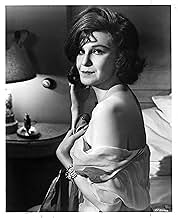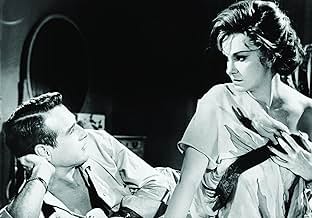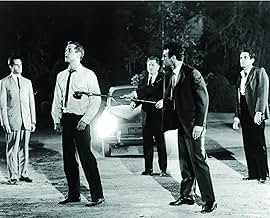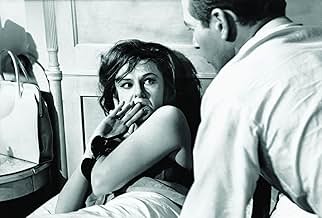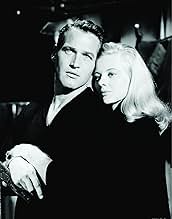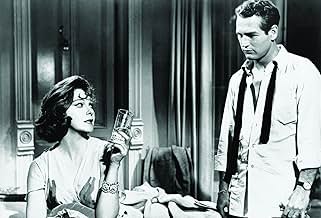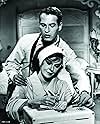A drifter and a faded film star, both traumatized by Hollywood, arrive to the guy's hometown, where the old bitter memories revive again.A drifter and a faded film star, both traumatized by Hollywood, arrive to the guy's hometown, where the old bitter memories revive again.A drifter and a faded film star, both traumatized by Hollywood, arrive to the guy's hometown, where the old bitter memories revive again.
- Director
- Writers
- Stars
- Won 1 Oscar
- 3 wins & 7 nominations total
- Director
- Writers
- All cast & crew
- Production, box office & more at IMDbPro
Featured reviews
I saw this film the year it first came out, and recently again on video. My reactions were rather surprisingly much the same: it's second-rate Tennessee Williams all glitzed up with one of the three or four most memorable performances by an actor, woman or man, I've ever seen--Geraldine Page as the Princess. She's so good she even makes Newman look wooden. This isn't acting--it's something beyond performance.
Geraldine Page, Paul Newman, Madeline Sherwood and Rip Torn all recreate their Broadway roles for the film version of "Sweet Bird of Youth," a 1962 film based on Tennessee Williams' play and directed by Richard Brooks.
Again and as usual, some bite has been taken out of the original story in order to get past the censors.
Geraldine Page is the drunk, drugged and over the hill movie star Alexandra del Lago, who has picked up with a Hollywood gigolo, Chance Wayne and promised him a film career. At present she's escaping from what she perceives as a disastrous comeback.
Chance returns with her to his home town, yearning for the respectability and success that has eluded him. Instead he runs into trouble from his ex-girlfriend's crooked politician father, Tom Finley (Ed Begley) and Finley's son, Tom Jr. (Rip Torn) who want him out of town because of what happened to Heavenly (Shirley Knight).
In the play, Chance has given Heavenly a venereal disease; in the film, she's had an abortion. Chance desperately tries to see and speak with Heavenly, appealing to her Aunt Nonnie (Mildred Dunnock), but it leads to more trouble than he bargained for.
Page is a powerhouse as Alexandra, more glamorous than we're used to seeing her and as sloppy a drunk and druggie as you'll ever find. Alexandra's a selfish user, and she's got the technique down pat.
The role of Chance, another selfish user, came fairly early on in the handsome Newman's career - he came very close to being typecast as these fast-talking amoral men. In those days, Newman struggled with a lack of emotional availability and these roles fit him beautifully.
Thankfully he grew to encompass parts in films such as he had in "The Verdict" and became one of our greatest American actors.
Madeline Sherwood, so effective in "Cat on a Hot Tin Roof," is equally good here as Boss Finley's girlfriend; her scene with Begley in her hotel room is truly terrifying.
Begley is fantastic, mean as dirt, as is Torn as his equally cruel son. And "Desperate Housewives" fans will be interested to see a slim, pretty Shirley Knight as Heavenly, a somewhat vapid role for such a strong actress.
The DVD has a screen test for Chance by Rip Torn, who would later marry Page. He and Page perform a scene between Alexandra and Chance from the play - though the scene is in the film, it has been changed slightly. It's total stage acting, quite different from the film, but both are excellent, Torn giving Chance a lot of intensity.
Though in those days he was very good-looking, he probably didn't come off as enough of a boy toy for the producers. It's a very interesting extra and well worth seeing, as is this somewhat watered-down "Sweet Bird of Youth."
Again and as usual, some bite has been taken out of the original story in order to get past the censors.
Geraldine Page is the drunk, drugged and over the hill movie star Alexandra del Lago, who has picked up with a Hollywood gigolo, Chance Wayne and promised him a film career. At present she's escaping from what she perceives as a disastrous comeback.
Chance returns with her to his home town, yearning for the respectability and success that has eluded him. Instead he runs into trouble from his ex-girlfriend's crooked politician father, Tom Finley (Ed Begley) and Finley's son, Tom Jr. (Rip Torn) who want him out of town because of what happened to Heavenly (Shirley Knight).
In the play, Chance has given Heavenly a venereal disease; in the film, she's had an abortion. Chance desperately tries to see and speak with Heavenly, appealing to her Aunt Nonnie (Mildred Dunnock), but it leads to more trouble than he bargained for.
Page is a powerhouse as Alexandra, more glamorous than we're used to seeing her and as sloppy a drunk and druggie as you'll ever find. Alexandra's a selfish user, and she's got the technique down pat.
The role of Chance, another selfish user, came fairly early on in the handsome Newman's career - he came very close to being typecast as these fast-talking amoral men. In those days, Newman struggled with a lack of emotional availability and these roles fit him beautifully.
Thankfully he grew to encompass parts in films such as he had in "The Verdict" and became one of our greatest American actors.
Madeline Sherwood, so effective in "Cat on a Hot Tin Roof," is equally good here as Boss Finley's girlfriend; her scene with Begley in her hotel room is truly terrifying.
Begley is fantastic, mean as dirt, as is Torn as his equally cruel son. And "Desperate Housewives" fans will be interested to see a slim, pretty Shirley Knight as Heavenly, a somewhat vapid role for such a strong actress.
The DVD has a screen test for Chance by Rip Torn, who would later marry Page. He and Page perform a scene between Alexandra and Chance from the play - though the scene is in the film, it has been changed slightly. It's total stage acting, quite different from the film, but both are excellent, Torn giving Chance a lot of intensity.
Though in those days he was very good-looking, he probably didn't come off as enough of a boy toy for the producers. It's a very interesting extra and well worth seeing, as is this somewhat watered-down "Sweet Bird of Youth."
Even with some of the seamier elements removed and with the tweaks in the storyline, this film has great value due to the acting of the principals. Newman stars as a would-be glory boy who has repeatedly failed to make a success of himself and has been reduced to playing gigolo to various wealthy women. Page is a deeply troubled actress on the downside who gets dragged with him to his home town when he plans to get an "in" in Hollywood through her, thus convincing his old sweetheart (Knight) that he worth leaving her family for. Unfortunately, Knight's father (Begley) and brother (Torn) have not forgiven Newman for the fallout from one of his previous visits to Knight. The main thrust of the drama concerns the animosity between Begley and Newman and the balancing act he must maintain with the weary, neurotic Page. Widescreen viewing is a must even though the bulk of the film takes place indoors or on sets. Newman is excellent throughout and the film is offers a rare exploitation of his physical charms (attributes he often fought against during his earlier career.) Page is wonderful, running the gamut of emotions and investing her character with loads of quirks and moments of interest. Knight does very well, though her role is primarily decorative. Begley took home an Oscar for his bellowing, overbearing, vulgar portrayal. Also scoring are Torn as the son trying unsuccessfully to impress Begley and the always interesting Sherwood in a rare sexy role. Dunnock turns in a typically worrisome, effective performance as a Newman supporter. There are two small, but intriguing, gaffes in the film. In one scene, Begley and his cronies are watching a newsreel in a room filled to the brim with smoke, yet (because the image was superimposed later) the screen never has any smoke in front of it. Later, Newman "lights" his cigarette off an oil lamp, yet it doesn't light. He visibly notices this and does his best to cover it. Some of the symbolism is heavy handed (check out the wacky opening!) The film may disappoint devotees of the original play, but it's polished production and memorable acting turns make it a strong piece of work.
Directed by Richard Brooks (Elmer Gantry (1960)), who also wrote the screenplay for this Tennessee Williams play, this above average drama with Paul Newman in the title role features Ed Begley's Academy Award winning Supporting Actor performance (on his only nomination). Geraldine Page received a Best Actress nomination, and Shirley Knight (The Dark at the Top of the Stairs (1960)) received her second Best Supporting Actress nomination.
Paul Newman plays a former young stud who returns to the Southern town of his youth after years of failing while attempting to make it as an actor in the movies. He's got a former, frequently drunk and/or high, aging actress (Page) in tow. As her gigolo and driver, he's still trying to use her to get what he wants in the film industry, trading on his looks and sex for her connections. Once home, however, he seeks out his former girlfriend (Knight), who happens to be the daughter of the biggest man in town, and one of the biggest in the whole state, Tom 'Boss' Finley (Begley). Finley more or less ran Newman's character out of town all those years ago and, with help from his son Tom Jr. (Rip Torn), won't hesitate to do it again. I won't spoil the reason why, nor reveal what happens in the end. Though neither is pleasant, it's the kind of delicious just desserts that Williams always has for his flawed protagonists. Begley is terrific as the hypocritical moralist, and Page is a kick, especially after her character regains her self- confidence. Madeline Sherwood plays 'Boss' Finley's mistress and twice AA Supporting Actress nominee Mildred Dunnock plays his sister.
Paul Newman plays a former young stud who returns to the Southern town of his youth after years of failing while attempting to make it as an actor in the movies. He's got a former, frequently drunk and/or high, aging actress (Page) in tow. As her gigolo and driver, he's still trying to use her to get what he wants in the film industry, trading on his looks and sex for her connections. Once home, however, he seeks out his former girlfriend (Knight), who happens to be the daughter of the biggest man in town, and one of the biggest in the whole state, Tom 'Boss' Finley (Begley). Finley more or less ran Newman's character out of town all those years ago and, with help from his son Tom Jr. (Rip Torn), won't hesitate to do it again. I won't spoil the reason why, nor reveal what happens in the end. Though neither is pleasant, it's the kind of delicious just desserts that Williams always has for his flawed protagonists. Begley is terrific as the hypocritical moralist, and Page is a kick, especially after her character regains her self- confidence. Madeline Sherwood plays 'Boss' Finley's mistress and twice AA Supporting Actress nominee Mildred Dunnock plays his sister.
Highflying melodrama permeates this Tennessee Williams play converted to film by Director Richard Brooks. What makes this Southern soap opera fascinating is the cast of tawdry characters, beginning with Chance Wayne (Paul Newman), a charming, ambitious gigolo who, despite his best efforts, can't quite make his worldly dreams come true.
But this time he's got a real plan for success. Chance returns to his hometown on the Gulf Coast, bringing with him a boozed-out, high-strung movie star named Alexandra Del Lago (Geraldine Page). Chance hopes to grab his hometown girlfriend, Heavenly (Shirley Knight), and the three of them skedaddle off to Hollywood, so that Chance can make it big in the movies, with the help of Alexandra, of course. Thing is ... Alexandra is so spaced out, she can't remember who Chance is, or where she met him.
Chance's homecoming is anything but cordial, mostly because of the influence of Heavenly's dad, 'Boss' Finley (Ed Begley) who, along with Finley, Jr. (Rip Torn), has it in for Chance. Complicating matters even more is Miss Lucy (Madeleine Sherwood), 'Boss' Finley's mistress whom Heavenly can't stand.
Having originated as a stage play, the film takes place mostly indoors, and is very talky. But the Tennessee Williams dialogue is predictably incisive, with commentary both on the whims of success and on the fleeting nature of youth.
By far, my favorite element of the film is the deliciously overwrought performance of Geraldine Page. With her distinctive voice, her mannerisms, and her stunning acting ability, she chews up the scenery and then some, overpowering everyone and everything else. No actress could have been more credible in the role of Alexandra, an almost comical character, whose firmness, vanity, self-centeredness, and dramatic flair make her both weak and strong at the same time.
Although flashbacks tend to disrupt the flow, the film's screen story is otherwise very good. With great performances from multiple actors, excellent color cinematography, and an appropriately jazzy/blues score, "Sweet Bird Of Youth" is a film treat, in the grand tradition of cinematic melodrama.
But this time he's got a real plan for success. Chance returns to his hometown on the Gulf Coast, bringing with him a boozed-out, high-strung movie star named Alexandra Del Lago (Geraldine Page). Chance hopes to grab his hometown girlfriend, Heavenly (Shirley Knight), and the three of them skedaddle off to Hollywood, so that Chance can make it big in the movies, with the help of Alexandra, of course. Thing is ... Alexandra is so spaced out, she can't remember who Chance is, or where she met him.
Chance's homecoming is anything but cordial, mostly because of the influence of Heavenly's dad, 'Boss' Finley (Ed Begley) who, along with Finley, Jr. (Rip Torn), has it in for Chance. Complicating matters even more is Miss Lucy (Madeleine Sherwood), 'Boss' Finley's mistress whom Heavenly can't stand.
Having originated as a stage play, the film takes place mostly indoors, and is very talky. But the Tennessee Williams dialogue is predictably incisive, with commentary both on the whims of success and on the fleeting nature of youth.
By far, my favorite element of the film is the deliciously overwrought performance of Geraldine Page. With her distinctive voice, her mannerisms, and her stunning acting ability, she chews up the scenery and then some, overpowering everyone and everything else. No actress could have been more credible in the role of Alexandra, an almost comical character, whose firmness, vanity, self-centeredness, and dramatic flair make her both weak and strong at the same time.
Although flashbacks tend to disrupt the flow, the film's screen story is otherwise very good. With great performances from multiple actors, excellent color cinematography, and an appropriately jazzy/blues score, "Sweet Bird Of Youth" is a film treat, in the grand tradition of cinematic melodrama.
Did you know
- TriviaBecause of its then-shocking subject matter, this film was given a pre-MPAA-rating advisory by the MPAA, which prohibited anyone under the age of 18 from attending. This was the equivalent of an X (later NC-17) rating. By today's standards, the film is tame enough that, when shown on Turner Classic Movies, it's rated TV-PG.
- GoofsIn the beginning of the movie as Chance is driving, he sees a sign saying "You Are Now Leaving Florida." The multi-lane highway runs very close to the beach with no buildings in between the road and beach and dozens of oil pumps adjacent to the highway. This clearly was filmed in southern California.
- Quotes
Chance Wayne: I like you. You are a nice monster.
- ConnectionsFeatured in Sweet Bird of Youth: Chasing Time (2006)
- SoundtracksEbb Tide
(1953) (uncredited)
Music by Robert Maxwell
Performed by Frank Chacksfield & His Orchestra as background music several times
Details
- Release date
- Country of origin
- Language
- Also known as
- El dulce pájaro de la juventud
- Filming locations
- Production companies
- See more company credits at IMDbPro
Box office
- Gross worldwide
- $60
- Runtime
- 2h(120 min)
- Aspect ratio
- 2.39 : 1
Contribute to this page
Suggest an edit or add missing content


